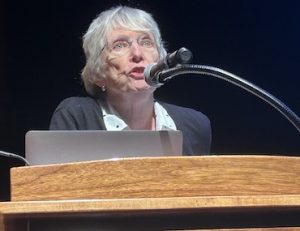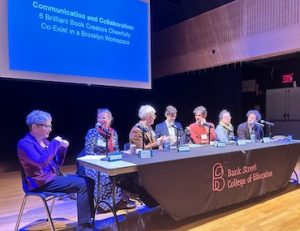On November 2, authors, illustrators, librarians, editors, and other members of the children’s literature community gathered for BookFest @ Bank Street, an annual event dedicated to the celebration, discovery, and discussion of books for children and teens. Hosted by the Bank Street Center for Children’s Literature in partnership with KidLit TV, the event was hosted both on-site at Bank Street’s Tabas Auditorium and via livestream, offering a dynamic space for attendees near and far to experience the program.
 This year’s program featured a keynote presentation by highly acclaimed author Lois Lowry, two-time recipient of the Newbery Medal for Number the Stars and The Giver. During her keynote, Lowry discussed the powerful impact of literature in the lives of children, sharing personal stories and photographs that illustrated the central role books have played in her family across generations.
This year’s program featured a keynote presentation by highly acclaimed author Lois Lowry, two-time recipient of the Newbery Medal for Number the Stars and The Giver. During her keynote, Lowry discussed the powerful impact of literature in the lives of children, sharing personal stories and photographs that illustrated the central role books have played in her family across generations.
“Often when I get an email that asks ‘How did you decide to become a writer?’ I begin by explaining that I was very fortunate to have grown up in a family that valued books,” said Lowry as she displayed a photo of her mother as a young child posed with books.
Lowry spoke about her children’s and grandchildren’s relationships with books. She shared that her son Ben named Charlotte’s Web as a book that affected him deeply as a child, noting how the line “No one was with her when she died,” resonated with him after his pet rabbit was injured and he stayed by its side in its final moments. Lowry said, “I’ve thought since then about that and the genius of E.B. White to write a line that would affect a child in that way.”
Lowry shared how children’s books can help introduce young readers to deeper emotions—joy, sadness, and the understanding that both are a part of every experience. She noted how reaching double-digits in age is often when a child’s relationship with reading and literature begins to change as books become a means of understanding life’s complexities.
For Lowry, reading The Yearling as a child was an important moment. “It was the first book that made me realize that it wasn’t true that there was nothing beneath my skin but light—there was sorrow there and there was tragedy coming, because there is in every life, and that is what books prepare us for when we’re that age,” she said.
Lowry closed her keynote by emphasizing the transformative power of books in providing comfort and hope in challenging times, stating, “I think for everybody there is a book like that, or could be, or should be, and you are the ones who put those books into the hands of the children who need them.”
Earlier in the day, the opening panel discussion paid tribute to the life and work of beloved educator, author, and longstanding member of the Bank Street community Robie Harris, GSE ’70, who passed away in January 2024. Known for her fearless commitment to addressing complex topics in children’s literature—from strong emotions to sensitive subjects, including HIV/AIDS and reproduction—Harris left a lasting impact on young readers and the literary community.
Moderated by Fatima Shaik, author and former co-chair of PEN America’s Children’s and Young Adults Books Committee, the panel featured family, close friends, and colleagues who shared personal reflections on Harris’s legacy. Panelists included her son Ben Harris, clinical psychologist and former parent of two Bank Street School for Children students; her cousin Elizabeth Levy, author; Hilary Van Dusen, Senior Executive Editor, Candlewick Press, and Editorial Lead, MIT Kids Press; Susan Kuklin, author; and Amy Hest, author. Lowry also joined the conversation.
To begin, Levy reflected on their shared journey as cousins, collaborators, and fellow authors, explaining how deeply connected their lives were. “Our lives and children’s lives and writing lives were totally intertwined,” she said. “Robie’s honesty, humor, and fierceness for the ones she loved and what she believed in persisted until the day she died.”
Next, Harris spoke about his mother’s work and the powerful way she connected with young readers’ emotions. “A child’s world is bursting at the seams, not with small feelings but with really big and really complicated feelings, feelings that can be scary and isolating, and her books created a world that allowed kids to see these big and complicated feelings and experiences and feel just a little less alone with them,” he said.
The second panel featured a conversation with notable New York City middle-grade authors Olugbemisola Rhuday-Perkovich, Emma Otheguy, Carlos Hernandez, and Karina Yan Glaser—all of whom have served as Writers-in-Residence at the School for Children over the years. Moderated by Shelley Diaz Vale, Reviews Director, School Library Journal, the discussion began by exploring how New York City inspired the storytelling, characters, and setting in their books.
Otheguy highlighted her novel Sofía Acosta Makes a Scene, which tells the story of a Cuban American girl living in the suburbs of New York who becomes an advocate for immigrants in her small community. As Sofía begins to speak out on issues, many of her neighbors see this as “making trouble” and “making a scene.” Otheguy said on the story arc, “What makes Sofía complete her journey is when she realizes that even as a child of immigrants in New York, she can boldly and joyfully make that scene and speak out about these issues she cares about, and to me, that is the story of New York.”
 The final panel featured celebrated authors and illustrators Sophie Blackall, Brian Floca, Doug Salati, Johnny Marciano, Dasha Tolstikova, and Rowboat Watkins, who work together in a shared studio in Brooklyn. Roxie Munro, an award-winning author and illustrator of over 50 nonfiction books for children, moderated the discussion.
The final panel featured celebrated authors and illustrators Sophie Blackall, Brian Floca, Doug Salati, Johnny Marciano, Dasha Tolstikova, and Rowboat Watkins, who work together in a shared studio in Brooklyn. Roxie Munro, an award-winning author and illustrator of over 50 nonfiction books for children, moderated the discussion.
Munro began with a brief history of the studio, which was built in the 1920s as a sweater factory. She also shared a video tour to give attendees a glimpse into the creative space. Following this introduction, the panel discussed their work habits, creative collaboration, individual processes, and upcoming projects.
“This can be very isolating work,” said Floca as he reflected on his early days working alone at home. “To have a community that normalizes doing this for a living, that provides a space for these conversations…it’s incredibly valuable to have a peer group.”
“We would like to thank our wonderful authors and illustrators for sharing their insights today and for their vital contributions to children’s literature, which remind us why these books matter more than ever—to help young readers find connection, empathy, and a sense of belonging,” said Cynthia Weill, Director, Center for Children’s Literature.